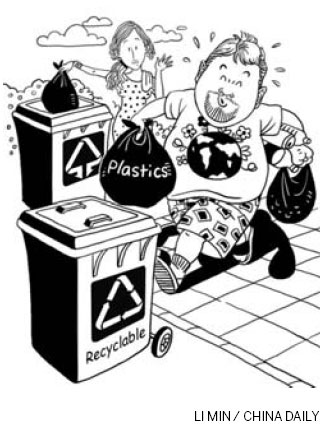Recycling begins at home
By Stuart Beaton ( China Daily ) Updated: 2010-06-29 09:12:10

My wife and I are trying to reduce our contribution to landfill, in whatever small we can. As Wen Hengfeng, a full-time garbage campaigner at Global Village Beijing says, "Even the smallest actions can help save the planet".
I hate taking the rubbish out. I wait until the bin is as full as it can get and possibly sprouting little satellite bags in its orbit, before I take it downstairs.
What I really hate, however, is the lack of recycling facilities outside my apartment.
There is one communal waste bin and everything from food scraps to glass bottles goes in it.
In my apartment, I try to separate out the different types of rubbish the day brings. The previous day's China Daily goes on to a pile to be sold to a recycler, as do the soft drink cans and bottles. Food scraps are put into one bag, plastics and other non-organic scraps into another.
Not that it matters, as it seems that there are people who do the recycling for us. As soon as my trash hits the bin, and I turn away, someone goes through it.
A mysterious recycler strips out anything of any value and all that remains is crushed eggshells and carrot peelings.
This is, in a way, the most efficient recycling system I've ever run across - but unfortunately it's not operating at every rubbish point.
Another way in which we try and cut down on waste is when we eat out. We very rarely, if ever, order food to take away, as this reduces the number of polystyrene containers that will find their way into the rubbish.
Quite often, if we know we'll have left over food from a meal in a restaurant, we take a reusable lunch box with us to put things in. We also try not to use disposable chopsticks where possible.
I've even taken to washing and reusing empty flour bags as shopping bags, as the woven fabric is far stronger than any plastic bags you buy at the checkout.
But all of this seems irrelevant when I see the waste from businesses and kitchens near our home.
There's a single collection truck for rubbish and everything is hurled into its maw at random, defeating any chance of easy recycling.

In Australia, two garbage trucks worked each route, one for non-recyclable materials, and the other for a separate bin for only recyclable materials. Some local governments even had a third bin in operation for "Green Waste", such as lawn clippings, leaves and other garden refuse.
It took no more time than ordinary waste collection, and paid for itself in terms of the recycled materials being sold on for their market price. Even the garden waste found new life in the form of composts and soils, which were again sold on for profit.
When speaking to my students about recycling, most of the time they're not interested. The message isn't getting through to some younger people in our society that recycling is a way to save the planet. They still think that the future doesn't hinge on their actions now.
Recycling is also a way of instilling some pride in China's natural environment. If ordinary Chinese people really cared about keeping their Motherland beautiful, they'd put their waste in bins, and not strew it across the countryside.
So think about it - recycling is not a matter of being Chinese or an expat, but of saving the environment we all live in. It doesn't take much to keep China green and clean!
|
|
|
|
|
|
|
|


























 Raymond Zhou:
Raymond Zhou: Pauline D Loh:
Pauline D Loh: Hot Pot
Hot Pot Eco China
Eco China China Dream
China Dream China Face
China Face






